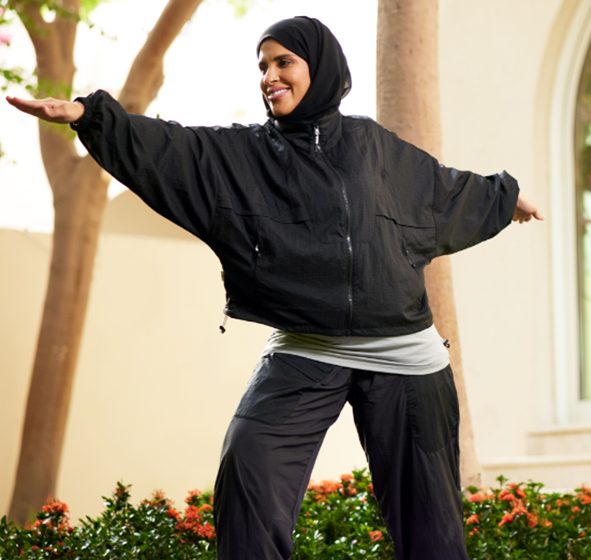SEVEN STEPS TOWARDS A HEALTHY AND HAPPY RAMADAN

By Abu Dhabi 360
Exercising and following a healthy lifestyle can be difficult at the best of times – but maintaining that lifestyle can prove to be even harder during the month of Ramadan. Fasting requires a lot of energy and commitment. With dramatic changes in eating habits and sleeping patterns this sudden shift in routine needs to be handled carefully.
To ensure we do not neglect our health, Abu Dhabi 360, Abu Dhabi Sports Council’s recently launched emirate-wide wellness program, and Certified Nutritionist, Dr. Mona Mobarak suggest seven key principles, and if followed correctly, Ramadan can be the perfect opportunity to develop discipline and to detox – physically, mentally, emotionally, and spiritually.
Time your exercise carefully:
You can still exercise during Ramadan if you do it strategically. For example, avoid aerobics classes at midday when the temperature is high and you cannot drink, as you’ll get too dehydrated. Instead, go for a power walk with friends or family just before or after Iftar. You will be able to hydrate before or immediately afterward, and the movement will jumpstart your metabolism so your body can better digest.
Dr. Mona Mobarak says, ‘‘Exercising in a fasted state is not an easy feat, especially when you add in daily stressors and warmer weather. Finding the best time for you will be a major key to keeping your exercise routine safe and sustainable.’’
Tip: Re-time your workout routine, so instead of exercising for 60 minutes, exercise for 45 minutes. If you are working the right muscles, a 45-minute workout will be just as effective as your usual workout. The optimum time to exercise during Ramadan is 30-45 minutes before Iftar or between Iftar and Suhoor before the start of the next day, as you can eat and drink after exercise and replenish and rehydrate the body.
Think about hydration.
Make sure you consume enough water between Iftar and Suhoor to keep your body properly hydrated—ideally eight to ten glasses each night. “Hydration helps maintain energy, making it easier to move your body, and it is also vital to heart health,” says Dr. Mona Mobarak.
Tip: In addition to drinking lots of water between sunset and sunrise, try eating fluid-rich fruits and vegetables such as apples, watermelon, cucumber, blueberries, tomatoes, and spinach. They will help keep hydration levels high during the day, which will help with energy levels.
Focus on strength training and keep an eye on how much cardio you are doing
According to Dr. Mona Mobarak, strength training might be a good time to prioritize during Ramadan over cardio workouts, as it’ll help to slow down the process of muscle loss while fasting. ‘‘I would suggest doing it pre-iftar but ultimately it is down to personal preference. If you prefer to train after Iftar try to keep your meal light and save your biggest meal for after your training session so you don’t feel uncomfortable when training,’’ says Dr. Mona Mobarak.
Tip: Carrying out high-intensity cardio can be quite difficult during Ramadan, as it increases our thirst whilst the body is already in a state of dehydration. Instead, carry out gentle jogs and light walks. If you prefer to exercise outside, avoid exercising in high temperatures or the sun for too long.
Nourishing foods are key
Suhoor should be nutritious and filling but not heavy, giving you enough energy to last until Iftar. Complex carbohydrates, including fruit, vegetables, chickpeas, and lentils, as well as healthy fats including olive oil, salmon, and avocado, will provide a slow-burn dose of energy that will last—even through a light workout before Iftar.
When you break your fast, minimize the amount of processed and fried food you eat. “You may think it’s harmless because you’ve been fasting for hours—but those foods will sit heavy in your stomach through the evening, make you feel listless, and may lead to weight gain if you eat them every evening,” says Dr. Mona Mobarak. “Instead, focus on foods that are good for your body, including dates, grilled chicken or fish, and fruits and vegetables.”
Avoid excess salt, caffeine, and fizzy drinks.
Some foods will naturally make us thirstier and leave us feeling sluggish throughout the day.
‘’Salt can have an immediate effect on thirst if eaten in excess. When cooking swap salt with herbs, spices, lemon, and lime to add flavor,’’ Dr. Mona Mobarak advises. ‘‘Avoid consuming beverages with sugar or caffeine. They might seem tempting for a quick boost of energy, but these drinks are diuretics, and will make the body lose water faster, making us feel thirstier and fatigued as the day goes on.”
Sleep and rest:
Getting adequate sleep is critical to our overall health and well-being, including our ability to function properly throughout the day. During Ramadan, our normal sleep routine can be interrupted by many social events that last late into the night, impacting our rest and overall health. ‘‘This Ramadan implement these three tips to encourage a restful night’s sleep and adequate rest. It will make you feel rejuvenated during the Holy Month’’, says Dr. Mona Mobarak.
Keep a check on your Suhoor and Iftar menu: Try not to go to bed without dinner or feeling overstuffedand avoid eating anything heavy or excessively oily after Iftar as this can negatively affect our quality of sleep.
Take a power nap: A 20-minute nap in the afternoon can do wonders to revive any flagging energy and focus levels. Remember to set an alarm as oversleeping can make you feel even sleepier than before a nap.
Make your bedroom comfortable: To improve the quality of your sleep environment make your bedroom comfortable, dark, and quiet, and avoid hot and chilly temperatures. Limit screen time too, such as mobile phones, laptops, or the TV, as the blue light from the screens can interfere with sleep quality. Instead, read a book or meditate for at least 45 minutes before you plan to go to sleep.
Be kind to yourself
Ramadan is a time for celebration and spiritual growth, so try not to push yourself too hard. Be kind to yourself. As Ramadan goes on, lifestyle changes will get easier. The first couple of days are always the hardest and energy levels tend to be low, but soon enough it will become your new normal as your body adapts to its new routine. Everything will steady out.
For more ideas on maintaining your wellness journey during Ramadan, download the Abu Dhabi 360 app.






